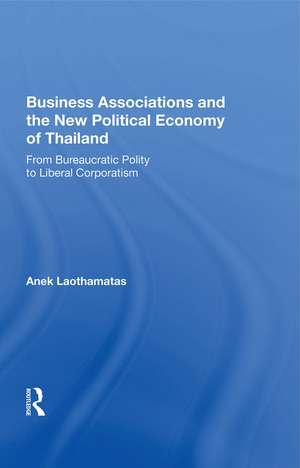Business Associations and the New Political Economy of Thailand: From Bureaucratic Polity to Liberal Corporatism
Autor Anek Laothamatasen Limba Engleză Hardback – 7 iun 2019
| Toate formatele și edițiile | Preț | Express |
|---|---|---|
| Paperback (1) | 389.38 lei 6-8 săpt. | |
| Taylor & Francis – 23 noi 2020 | 389.38 lei 6-8 săpt. | |
| Hardback (1) | 766.12 lei 6-8 săpt. | |
| Taylor & Francis – 7 iun 2019 | 766.12 lei 6-8 săpt. |
Preț: 766.12 lei
Preț vechi: 1028.55 lei
-26% Nou
Puncte Express: 1149
Preț estimativ în valută:
146.61€ • 159.20$ • 123.16£
146.61€ • 159.20$ • 123.16£
Carte tipărită la comandă
Livrare economică 22 aprilie-06 mai
Preluare comenzi: 021 569.72.76
Specificații
ISBN-13: 9780367016340
ISBN-10: 0367016346
Pagini: 216
Dimensiuni: 152 x 229 mm
Greutate: 0.56 kg
Ediția:1
Editura: Taylor & Francis
Colecția Routledge
Locul publicării:Oxford, United Kingdom
ISBN-10: 0367016346
Pagini: 216
Dimensiuni: 152 x 229 mm
Greutate: 0.56 kg
Ediția:1
Editura: Taylor & Francis
Colecția Routledge
Locul publicării:Oxford, United Kingdom
Cuprins
Note on Currency -- Preface -- Introduction -- The Rise of Organized Business -- The Principal Associations -- Associations and the JPPCCs -- Associations as Interest Groups -- The Economic Role of Associations -- Liberal Corporatism: The Thai Model -- Epilogue -- Studies of the East Asian Institute
Descriere
This outstanding contribution to our understanding of Thailand’s political economic system is perhaps the first major English-language work that provides an up-to-date analysis of the country widely hailed as Asia’s next newly industrialized country. Dr. Laothamatas argues that, at least in the realm of economic decision-making, Thailand has moved away from a pure form of bureaucratic polity to a system he refers to as liberal corporatism. He presents detailed empirical data regarding chambers of commerce, their peak organizations, and the nation’s trade associations, all of which will have a profound influence on the direction Thailand’s political economy takes. The book should be of great interest to students of Thai politics, as it directly challenges Fred Riggs’ “bureaucratic polity†model, which has so long dominated the thinking of both Western and Thai scholars. Policymakers and development specialists interested in the state-business relationship also will find the study useful, given the author’s deft placement of the Thai case in the context of the debate on modernization theory and the recent spate of writings on the role of the state in newly industrializing countries.
